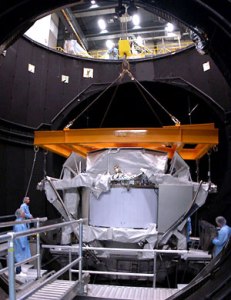The Alpha Magnetic Spectrometer (AMS) particle detector is set to take off on the 29th of April from the space shuttle, Endeavour, and will be installed at the International Space Station.
The detector would provide data related to the dark matter and antimatter in the Universe and will help unravel many secrets about the phenomena related to cosmos and modern physics. The detector would be stationed in space for a period of 10 years.
 AMS Detector
AMS Detector
Physicists at CERN laboratories mainly study the behaviour of matter and antimatter. Studies reveal that both matter and antimatter have identical properties except for their antiparticles, which have opposite charges. Therefore, they burn out each other when they meet. Scientists suggest that for the Big Bang to happen, both these particles would have been created in equal amounts. Many other questions about the universe could be answered by particle detection and cosmic ray tracking which would be done by the AMS detector.
The Spokesperson for AMS, Samuel Ting explained that the AMS would provide information by observing the particles about which we do not have much data so far, in addition to tracking the origin of cosmic rays and observing matter and antimatter.
The AMS is designed with high sensitivity with which it can single out an antinucleus from a crowd of billion different particles while studying the flux of the cosmic rays. It would also be able to detect charged particles such as atomic nuclei, electrons and protons that continuously attack the earth’s surface.
The Director General of CERN, Rolf Heuer explained that AMS and LHC would provide data that would explain many mysteries of the Universe. He also said that the AMS in particular would gather data about the dark matter; if the dark matter is made up of supersymmetric particles, then the AMS would be able to detect it by tracking the cosmic rays. The AMS is an experiment that has been recognised by CERN, who proposes to open the Payload Operation Centre (POC) for operating the AMS detector and receiving the data captured by it from the International Space Station.